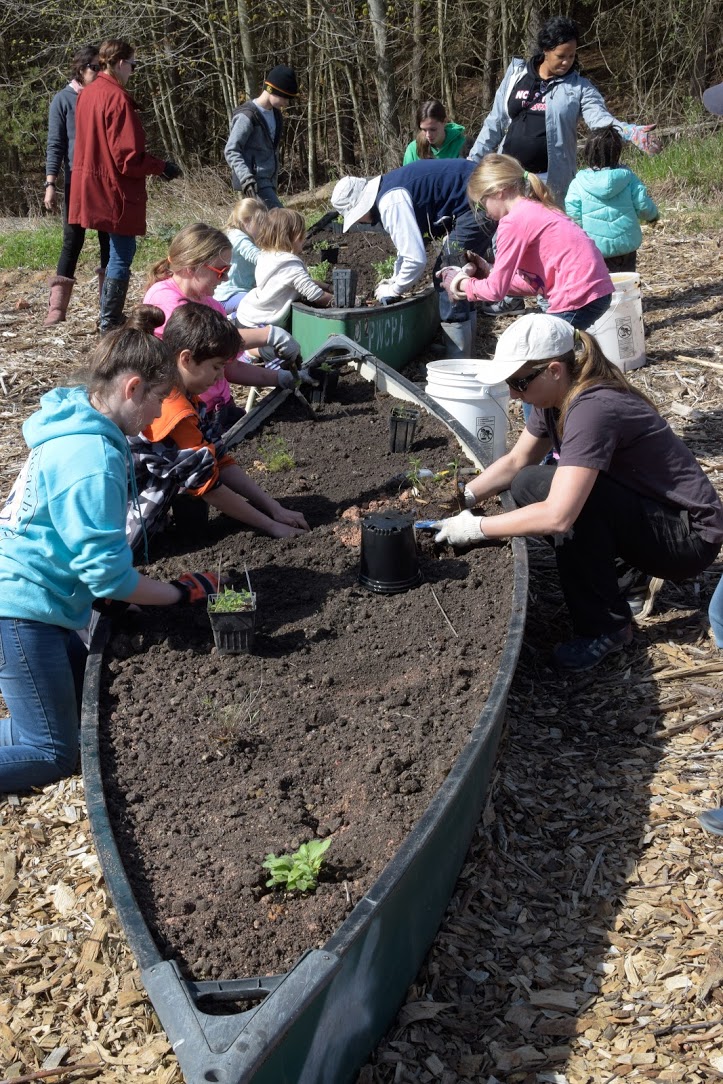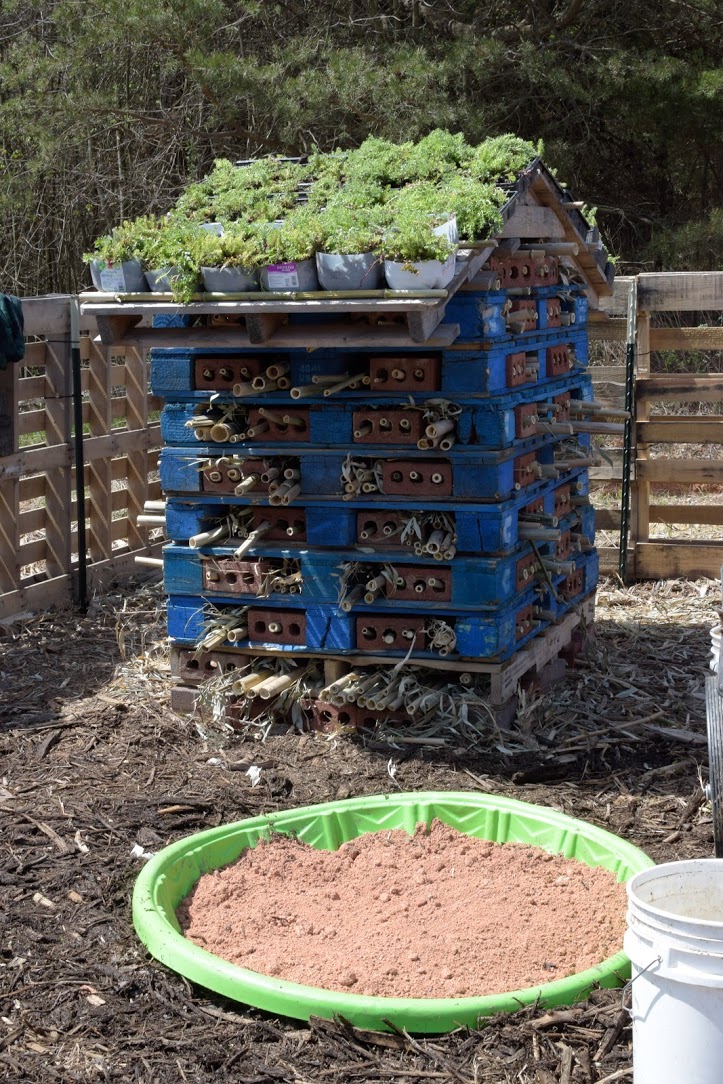Landfill Eco Park Bee and Pollinator Meadow
'Boatloads' of Pollinator Plants Installed at Prince William Landfill
April, 2018
By Roger LeBlanc (photo slide show below)
When you imagine a flower garden, do you picture planting in canoes and old car tires? That's exactly what several environmental leaders envisioned when they designed the plan to transform a half acre site at the Prince William County Landfill into a beautiful pollinator garden. Repurposed canoes, pallets, and tires were used to create raised garden beds, a native bee hotel, and a walking path through a pollinator-friendly meadow. These upcycled goods will support the health of native bees, honeybees, insects, and other wildlife for years to come.
The project was a joint effort that brought several community organizations together. Keep Prince William Beautiful secured $20,000 from a Keep America Beautiful/Lowe's Community Impact grant to fund the project. The Prince William County Solid Waste Division, Bees in Schools, LLC, the Prince William Conservation Alliance, and George Mason University's Potomac Environmental Research and Education Center all worked together to make the undertaking possible. Volunteer planting days open to the community were held on April 14 and April 21 in celebration of Earth Day.
"Our whole goal is attracting pollinators to a spot where we know there are very few right now," said Dr. Cynthia Smith, Associate Professor at George Mason University, as she thanked the crowd of 101 volunteers on the first work day, "In three hours we took a field with some mulch and now we've got a pollinator garden with seeds installed, before the rain tomorrow. We could not have done this without your help."
Janelle Bryant, a member of the Virginia Cooperative Extension Master Gardeners, shared her motivation for volunteering for the project, "It's gratifying to see that the county is planting these gardens to attract native bees - if we don't create these gardens now we could lose many of our important pollinators."
Bee population numbers are declining rapidly due to factors such as colony collapse disorder, pesticides and herbicides from modern agriculture, and habitat loss. The bee hotels will serve as nesting habitat for native bees, who will utilize plants in the raised beds and the flower meadow as food sources. Louise Edsall, a beekeeper and founder of Bees in Schools, will also install bee hives to produce local honey at the landfill and each hive can be home to about 60,000 bees. Edsall is expecting about 180 species of native pollinators to make the site home.
"Everything that we have revolves around the ability of insects to pollinate our crops," says Valerie Huelsman, a Program Specialist for Prince William County, "It's great to be out here building a habitat where the insects will lay their eggs and develop. We are a part of an ecosystem where everything depends on everything else. We need to make sure we are taking care of the insects that are taking care of us."
Volunteers throughout the morning cut bamboo to build the bee hotels, spread seeds in the pollinator meadows, filled canoes and tires with compost and dirt, and finally planted the purple milkwood, mountain mint, scarlet beebalm and other native varieties to complete the project.
 "I was shocked to see this happening," says Karen Sylvester, a volunteer and graduate student from George Mason University, "We don't often think of landfills as green spaces, so it's amazing to see this landfill coming together to repurpose used goods to make this happen"
"I was shocked to see this happening," says Karen Sylvester, a volunteer and graduate student from George Mason University, "We don't often think of landfills as green spaces, so it's amazing to see this landfill coming together to repurpose used goods to make this happen"
Material reuse was an important priority for the project, Prince William County is always looking for creative ways to support the environment, and make operations more sustainable. Repurposing items that would have ended up in landfill, helps extend the lifespan of the landfill for future generations.
"Nine hundred tons of wooden pallets come to the landfill every year," says Scott McDonald, the County Recycling Program Manager, "The pallets are being reused to create the bee hotels here today. It's exciting to see the canoes from Prince William Park and Recreation, and tires brought to the landfill used to make beautiful planters and spaces for insect habitat."
"It has been wonderful partnering with the other groups involved with planning and implementation," says Lynda Kummelt, Environmental Programs Manager for Keep Prince William Beautiful, "I look forward to seeing the bees flourish in this beautiful habitat."
The pollinator garden will be a new feature on the Landfill bus tour when schools and other groups visit, and there are opportunities for teachers to work field trips to the site into their science curriculum.
Bryant hopes that learning about the project will encourage community members to build similar gardens in their own homes, "Building habitat for native bees is critical - we need them for our food crops more than we realize. As we lose open spaces in the county, our front yards and backyards are going to have to become the wild spaces for the insects to go to."
The bee habitat and pollinator meadow is another facet of the Prince William Landfill Eco Park project, which is designed to be a community resource producing green energy, recovering valuable materials and providing unique opportunities for education and research.